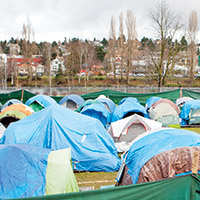SPU Again Welcomes Tent City 3
 This Winter Quarter SPU will host Tent City 3, a self-managed encampment of individuals experiencing homelessness, on Tiffany Loop in lower campus. If our positive experience in Winter 2012 is any indicator, this experience will be a great opportunity for friendships, service, and learning for SPU students and Tent City 3 residents.
This Winter Quarter SPU will host Tent City 3, a self-managed encampment of individuals experiencing homelessness, on Tiffany Loop in lower campus. If our positive experience in Winter 2012 is any indicator, this experience will be a great opportunity for friendships, service, and learning for SPU students and Tent City 3 residents.
Tent City 3 is a unique stopgap response to inadequate shelters and affordable housing; its residents are committed to the idea that camping in community with a group of like-minded, sober, safety-conscious, nonviolent people is safer than braving the streets alone. When SPU hosted Tent City 3 on campus in Winter 2012 many students seized the opportunity to interact: knitting groups, hot meals, chess tournaments, collection drives, and educational forums addressing the issue of homelessness sprang up almost overnight. When Tent City 3 moved out at the end of Winter Quarter students, faculty, Tent City 3 residents, and Queen Anne neighbors agreed that the interactions had been meaningful.
As we look ahead to this winter, we hope for more interactions like this, and then some. New friendships, compassionate service, and charitable giving are a great start, and they’re needed in order for authentic understanding to develop. But we’re also hopeful that our time with Tent City 3 will equip our community to use our academic studies, our vocational decision-making, even our privilege as people at a private Christian university, to come alongside our new friends’ struggle to end homelessness.
In Beyond Charity, renowned Christian reconciliation advocate, John Perkins, writes of community development in urban America: “Instead of coming with a quick-fix solution, more … people of all races need to hear and answer the call of God to put themselves in direct, personal relationship to the urban community in order to discover the felt needs of the people.”
This “felt-need concept” highlights the value of authentic interaction with people whose experience is different from our own. In coming together and listening well, we hope to engage in reconciling friendships with Tent City 3 residents, moving away from assumptions toward partnership as we work together toward an end to homelessness. As we welcome our new temporary neighbors, we hope these relationships will refine our understanding, grow our empathy and point us toward realistic solutions to the problem of homelessness.
To learn more, visit spu.edu/tentcity to join this conversation, learn about upcoming educational forums, opportunities to take a tour of Tent City 3, serve a meal, or organize a collection drive.
For more information, email Center for Learning Director Niki Amarantides or me, Owen Sallee, host committee co-chairs, at tentcity3@spu.edu.
Owen Sallee
Coordinator for Global and Urban Involvement
John Perkins Center for Reconciliation, Leadership Training, and Community Development


